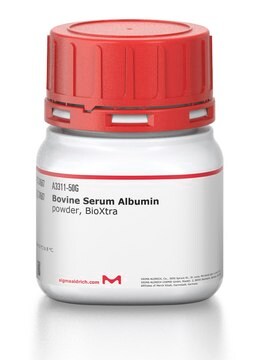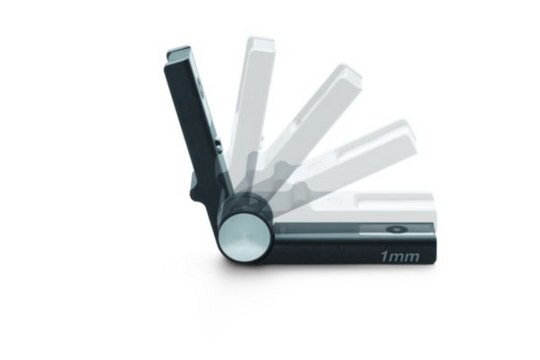A1933
Bovine Serum Albumin
chromatographically purified, New Zealand origin, low endotoxin, suitable for cell culture, pH 7, ≥98%
Synonym(s):
Albumin bovine serum, BSA, Bovine albumin
About This Item
Recommended Products
biological source
bovine
Quality Level
product line
BioReagent
Assay
≥98%
form
lyophilized powder
mol wt
~66 kDa
purified by
chromatography
packaging
poly bottle of
origin
New Zealand origin
technique(s)
cell culture | mammalian: suitable
impurities
≤1 EU/mg endotoxin
pH
7
solubility
water: soluble (40 mg/ml)
UniProt accession no.
storage temp.
2-8°C
Gene Information
bovine ... ALB(280717)
Looking for similar products? Visit Product Comparison Guide
General description
Application
- as a standard in bradford protein estimation method in yeast cells
- in elispot assay of blood cells
- as a blocking agent in immunohistochemical studies of transplant
- as a blocking agent in western blotting of human gastric cancer cell lines
Biochem/physiol Actions
Features and Benefits
- Tested for use in cell culture
- Low endotoxin
Preparation Note
Storage Class Code
11 - Combustible Solids
WGK
WGK 3
Flash Point(F)
Not applicable
Flash Point(C)
Not applicable
Personal Protective Equipment
Choose from one of the most recent versions:
Certificates of Analysis (COA)
Don't see the Right Version?
If you require a particular version, you can look up a specific certificate by the Lot or Batch number.
Already Own This Product?
Find documentation for the products that you have recently purchased in the Document Library.
Customers Also Viewed
Articles
This page segues to comprehensive insights on how serum albumin and other important cell culture components affect the performance of serum-free cell culture systems used for biomanufacturing heterologous proteins including monoclonal antibodies. The page introduces the in vitro chemistry and biochemistry of albumin. These insights may also be applied to ex vivo and tissue engineering applications.
Our team of scientists has experience in all areas of research including Life Science, Material Science, Chemical Synthesis, Chromatography, Analytical and many others.
Contact Technical Service




